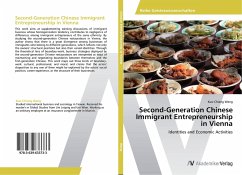
Second-Generation Chinese Immigrant Entrepreneurship in Vienna
Identities and Economic Activities
Versandkostenfrei!
Versandfertig in 6-10 Tagen
33,99 €
inkl. MwSt.

PAYBACK Punkte
17 °P sammeln!
This work aims at supplementing existing discussions of immigrant business whose homogenization tendency contributes to negligence of differences among immigrant entrepreneurs of the same ethnicity. By studying the second-generation Chinese restaurateurs in Vienna, the author shows that there is a great divergence among businesses of immigrants who belong to different generations, which reflects not only the owners' structural positions but also their varied identities. Through the theoretical lens of boundary-work, business strategies deployed by the second-generation Chinese restaurateurs ar...
This work aims at supplementing existing discussions of immigrant business whose homogenization tendency contributes to negligence of differences among immigrant entrepreneurs of the same ethnicity. By studying the second-generation Chinese restaurateurs in Vienna, the author shows that there is a great divergence among businesses of immigrants who belong to different generations, which reflects not only the owners' structural positions but also their varied identities. Through the theoretical lens of boundary-work, business strategies deployed by the second-generation Chinese restaurateurs are interpreted as ways of maintaining and negotiating boundaries between themselves and the first-generation Chinese. This work maps out three kinds of boundary-work: cultural, professional, and moral, and claims that the actors' disposition to any one of them might be explained by the actors' social position, career experience, or the structure of their businesses.












